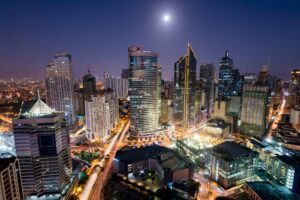July FDI net inflows hit $1.3 billion

By Katherine K. Chan, reporter
NET INFLOWS of foreign direct investments (FDI) into the Philippines declined in July but hit their highest level in a year, the Bangko Sentral ng Pilipinas (BSP) said on Friday.
FDI net inflows went down by 7.5% to $1.268 billion in July from $1.37 billion the same month a year ago, but was the highest monthly tally seen since.
Meanwhile, month on month, FDIs surged from the $376-million net inflow recorded in June.
“Net foreign direct investments into the Philippines remained positive in July 2025, with inflows from Japan and into wholesale and retail trade taking the lead,” the BSP said in a statement.
It added that the year-on-year decline was mainly due to the 39.4% drop in net investments by foreigners in debt instruments to $711 million from $1.172 billion a year prior.
This decrease was tempered by the 181.7% growth in nonresidents overall investments in equity and investment fund shares to $557 million from $198 million.
Broken down, foreigners’ net investments in equity capital other than reinvestment of earnings ballooned by 450.6% to $418 million in July from $76 million last year.
This, as equity placements surged by 241.7% to $460 from $135 million, while withdrawals declined by 28.4% to $42 million from $59 million.
The bulk or 89% of the equity capital placements in July came from from Japan, while 8% were from the United States.
These were invested mainly in wholesale and retail trade (73%), followed by manufacturing (12%), and real estate activities (8%).
Meanwhile, reinvestment of earnings climbed by 14.3% year on year to $139 million from $122 million.
The one-year high FDI net inflow logged in July were “driven mainly by inter-company borrowings and reinvested earnings, signaling sustained confidence from existing investors despite global uncertainty,” Union Bank of the Philippines (UnionBank) Chief Economist Ruben Carlo O. Asuncion said a Viber message.
In July, the Philippines secured a trade deal with the United States following a state visit by President Ferdinand R. Marcos, Jr. to Washington, getting a 19% “reciprocal” import tariff. Other countries also reached agreements with the US ahead of an initial July 9 deadline, which was eventually extended.
JANUARY TO JULY
In the first seven months, FDI net inflows went down by 20% year on year to $4.685 billion
from $5.856 billion, BSP data showed.
This came as nonresidents’ net investments in debt instruments also dropped by 17.5% to $3.248 billion from $3.937 billion.
Foreigners’ investments in equity capital other than the reinvestment of earnings also slumped by 43.5% to $724 million in the period from $1.283 billion a year earlier.
Broken down, placements dropped by 24.9% year on year to $1.206 billion from $1.605 billion, while withdrawals rose by 49.7% to $481 million from $322 million.
Equity capital placements during the period mostly came from Japan (60%), the United States (15%), Singapore (8%) and South Korea (5%).
The manufacturing sector cornered 36% of the total, while 30% went to wholesale and retail trade and 15% to real estate activities.
The BSP expects FDI net inflows to reach $7.5 billion this year.
Mr. Asuncion said reaching this would be a challenge as investment inflows remain below trend.
“The recent BSP rate cut, aimed at supporting growth amid easing inflation and soft external demand, could improve investor sentiment and financing conditions, but structural reforms and policy consistency will remain key to attracting fresh equity inflows,” he added.
Security Bank Chief Economist Angelo B. Taningco added that he expects the “sluggish” performance of foreign direct investments to persist due to the ongoing corruption scandal.
“The governance issues surrounding corruption investigation in government flood control projects have likely dampened investor sentiment and business confidence, which in turn could temper FDI inflows for the rest of the year,” he said in an e-mail.
On Thursday, the BSP delivered a surprise 25-basis-point (bp) cut to bring the policy rate to a three-year low of 4.75%, noting the need to support the economy as growth prospects have softened due to the impact of the ongoing graft scandal on business sentiment and government spending.
This was its fourth straight quarter-point reduction since April. The Monetary Board has now lowered benchmark borrowing costs by 175 bps since it began its easing cycle in August 2024.
BSP Governor Eli M. Remolona, Jr. said another rate cut is possible at their last policy meeting for this year on Dec. 11, with more reductions beyond that also on the table.



















